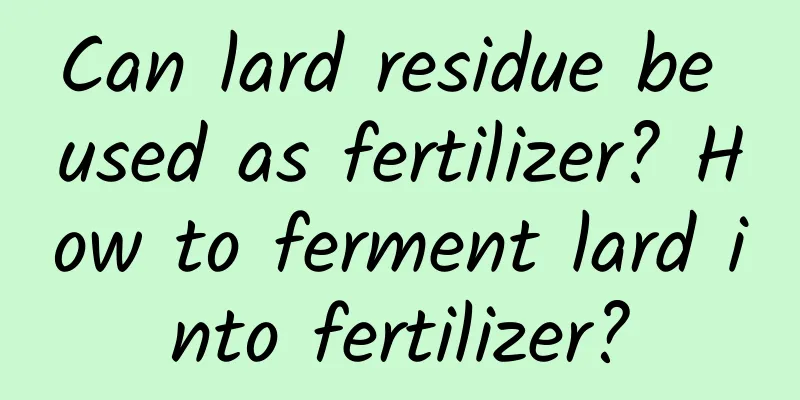Can lard residue be used as fertilizer? How to ferment lard into fertilizer?

|
Oil residue fertilizer is a high-quality farmyard manure made from the residue left after pressing and removing the oil from plant seeds that are rich in oil. It is usually used for crops with high economic value such as vegetables and fruit trees. Oil residue can be used as fertilizer, but it needs to be fully fermented before it can be used for fertilization. It can make peanuts grow better, but if it is not fermented and directly contacts the roots of flowers, it may damage the roots of the plants. Oil residue fertilizer productionWhen making oil residue fertilizer, you can add it directly to the bottom of the soil. After fermenting for 1-2 months, it can be applied as fertilizer. You can also mix it with the soil. Then add lime and pesticides, place it under the sun for fermentation, or mix it with clean water, put it in a sealed container, and ferment it in a cool and ventilated place. When using it, just take the clear liquid on the top. Use of oil residue fertilizer1. Long roots When using oil residue fertilizer, be sure to add water to dilute it in proportion to reduce the concentration before normal fertilization can be carried out. However, it should be noted that it must be used in small amounts and multiple times to better play its role. 2. Insecticide The application time can generally be chosen 3 weeks before sowing, because the residue fertilizer will generate high temperature when it decomposes and ferments in the soil, producing various organic acids, which can kill all pests in the soil. |
<<: Can edamame shells be used as fertilizer? Can they be dried and used directly as fertilizer?
>>: Can lotus seed shells be used as fertilizer?
Recommend
Is it profitable to grow bonsai? What are the prospects and profits of growing bonsai?
Is it profitable to grow bonsai? The mainstream o...
What is the difference between the large-leaved umbrella and the Schefflera arborvitae
1. The difference between leaves The leaves of th...
Cutting propagation method of lipstick flower
Lipstick flower cutting time The most commonly us...
How to grow potatoes for high yield?
Potatoes are widely grown in our country, especia...
How to prolong the flowering period of chrysanthemums
1. Rizhao Generally we are talking about autumn c...
Can blueberries be grown in Hunan?
Can blueberries be grown in Hunan? Blueberries ca...
Why do Boston fern leaves dry up?
Causes of dryness Too much light Boston fern is a...
How to grow Milan potted plants and what to pay attention to
Milan potted plant growth habits Milan potted pla...
What is the function of beauty plum
The ornamental effect of plum blossom The beauty ...
Can slow-release fertilizer be used for Christmas cactus (how to fertilize and maintain Christmas cactus after its flowering period)
After the Christmas cactus blooms, you can use sl...
Nutritional value of avocado
1. Trace metal elements Avocados contain many typ...
What insects can carbosulfan treat?
Carbosulfan has systemic, stomach poison and cont...
Cultivation methods and precautions of chestnuts
Chestnuts are easy to grow, but the planting meth...
What is Chunbulao?
What is Chunbulao? "Chunbulao" is a fam...
When is the best time to repot the white palm?
Time to repot white palm Anthurium grows relative...









